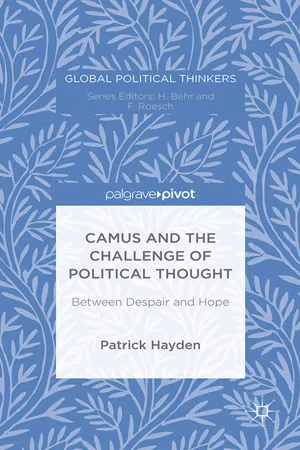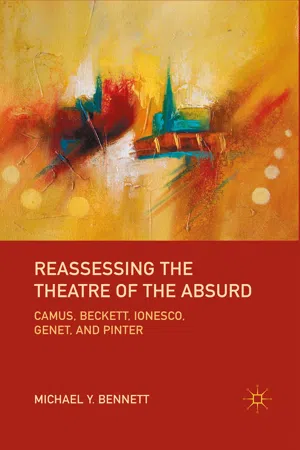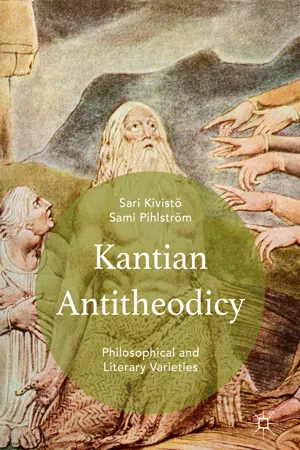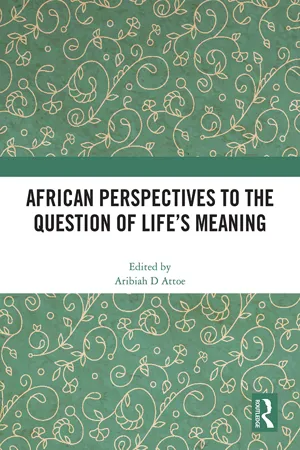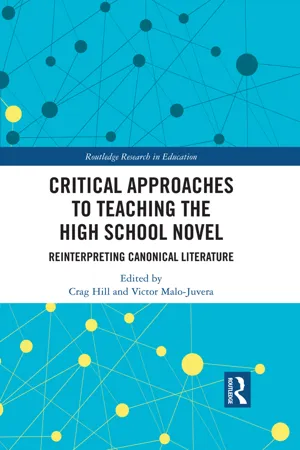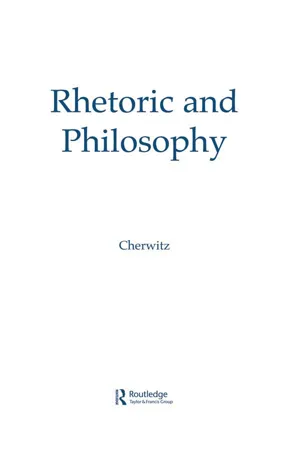Literature
Absurdism
Absurdism is a philosophical concept that explores the inherent meaninglessness and irrationality of the world. It suggests that humans seek meaning in a universe that has none, leading to feelings of confusion and alienation. In literature, absurdism is often portrayed through characters and situations that highlight the futility of human existence and the struggle to find purpose.
Written by Perlego with AI-assistance
Related key terms
1 of 5
10 Key excerpts on "Absurdism"
- eBook - PDF
Roman Polanski
The Cinema of a Cultural Traveller
- Ewa Mazierska(Author)
- 2007(Publication Date)
- I.B. Tauris(Publisher)
Albert Camus in his essay Le Mythe de Sisyphe ( The Myth of Sisyphus , 1955) regards human life as purposeless and lacking in harmony with its surroundings, and claims that realisation of this predicament produces a state of metaphysical anguish (see Camus 1955; Esslin 1968: 23–4; Hinchliffe 1969: 1). The movement most strongly associated with the idea of absurdity of human life is the Theatre of the Absurd, represented by such authors as Samuel Beckett, Eugene Ionesco, Arthur Adamov and Harold Pinter, but its literary predecessors include surrealists, Antonin Artaud, Franz Kafka, Lewis Carroll and even William Shakespeare – all of them names very relevant to Polanski’s cinema as sources of inspiration or even in providing material adapted for the screen. The philosophical roots of the Theatre of the Absurd lie in existentialist philosophy. Existentialism, in very general terms, is a philosophic doctrine or intellectual movement proclaiming T H E A B S U R D A N D H O W T O D E A L W I T H I T 25 that people have absolute freedom of choice and that the universe is absurd. In the writings of the leaders of this movement, such as Jean-Paul Sartre and Camus, we find themes such as loneliness, the impossibility of communicating with fellow human beings, the absence of God, the strangeness of ordinary objects, the inevitability of death and, consequently, hopelessness and despair. Camus claims that ‘at any street corner the feeling of absurdity can strike any man in the face’ (Camus 1955: 16), but it was also pointed out that modern man is more prone to absurdity than his ancestors. Theatre of the Absurd and existential philosophy thus constituted the thinkers’ and artists’ response to modernity, and especially to the horrors of the Second World War (see Esslin 1968: 23). Absurdist literature also had a strong presence in Poland. - eBook - ePub
Camus and the Challenge of Political Thought
Between Despair and Hope
- P. Hayden(Author)
- 2016(Publication Date)
- Palgrave Pivot(Publisher)
Caligula , alongside philosophical essays to elucidate his ideas about modern society, morality and politics. The dominant theme of Camus’s account of the absurd is expressed, I posit, as critical thought regarding the disorienting limits or boundary-situations of human existence. Such limits not only prevent attaining certain knowledge of any deep or absolute meaning beneath the contingency of existence, but also supply the conditions enabling the creation of particular historical, moral and political meanings and values.Introducing the absurdCommenting on the motivations of writers, the literary critic Roland Barthes once remarked: ‘The world exists and the writer speaks’ (1972: 258). For Barthes, the writer is compelled by an inner force to create meaning in the world, to give coherence to what is intrinsically incoherent. This passionate relationship between philosophy and literature, meaning and the world is, I believe, a useful way to characterize Camus’s writing on the absurd. The concept of the absurd is of the utmost importance for Camus, because it affords us a direct view not only of the equivocal desire for union between individual and world, but also of the dizzying fracture between human consciousness and the universe. The world and its meanings, in other words, rest upon two kinds of relations and their inclusive disjunction: those of consonance and those of dissonance. It is the ineradicable tension as well as the inseparable counterbalancing between these two relations that defines the absurd and drives Camus to speak of the world or, better, to give voice to the experience of a universe that is otherwise silent. In this way, Camus’s writings on the absurd serve as general statements about the paradox of the human condition. - eBook - PDF
Reassessing the Theatre of the Absurd
Camus, Beckett, Ionesco, Genet, and Pinter
- M. Bennett(Author)
- 2011(Publication Date)
- Palgrave Macmillan(Publisher)
18 For the definition of absurd, Esslin turns to Ionesco. Esslin translates this quote from an essay Ionesco had written on Kafka in 1957 (this is the entire quote as the ellipse is a part of it): “Absurd is that which is devoid of purpose . . . Cut off from his religious, metaphysical, and transcendental roots, man is lost; all his actions become senseless, absurd, useless.” 19 Stemming from this definition, and its constant and continued use in the field, scholars and common readers alike, most likely because of the influence of this book, have basically understood the absurd and the Theatre of the Absurd as emphasizing the purposeless- ness and senselessness of life. The sense of the purposelessness of life comes directly from what Esslin further has to say: that the theme of the plays of the Theatre of the Absurd is “their sense of metaphysical anguish at the absurdity of the human condition.” 20 Though Esslin says other playwrights discuss this same subject matter—the “sense of the senselessness of life”—such as Jean Giraudoux, Jean Anouilh, Armand Salacrou, Jean-Paul Sartre, and Camus, these other playwrights do so in highly lucid and logically constructed reasoning, where this “new content” is presented in “the old convention.” 21 What absurd play- wrights do, however, is to match the philosophy with the aesthetic: “. . . the 6 ● Reassessing the Theatre of the Absurd Theatre of the Absurd strives to express its sense of senselessness of the human condition and the inadequacy of the rational approach by the open abandonment of rational devices and discursive thought.” 22 In other words, Esslin suggests that the philosophy and the aesthetic are “absurd”; the the- atre itself and/or what happens on stage are just as irrational and senseless as life itself. - eBook - PDF
European Literature from Romanticism to Postmodernism
A Reader in Aesthetic Practice
- Martin Travers(Author)
- 2006(Publication Date)
- Continuum(Publisher)
This is the second consequence. Absurdist man 288 European Literature from Romanticism to Postmodernism glimpses thus a universe that is burning but icy, transparent and limited, where nothing is possible but all is given, and beyond which all is destruction and nothingness. He might then decide to agree to live in such a universe and draw from it his strength, his refusal to hope, and his incontrovertible evidence of a life that has no consolations. Like Nietzsche before him, Camus used parable, myth and allegory' to illustrate his philosophy, drawing in this particular work upon the legend of Sisyphus, the King of Corinth, whom the gods have condemned to roll the same rock up a hill, day after day, knowing that it will simply roll hack down. Camus' existential humanism, however, allows him to glimpse a positive dimension to Sisyphus' hopeless task. One does not discover the Absurd without first trying to write a manual of happiness. 'What! To go through such a narrow gate . . . ?' But there is only one world. Happiness and the Absurd are two sons sprung from the same soil. They cannot be separated. The mistake would be to say that happiness is necessarily born from a discovery of the Absurd. It would be just as accurate to say that the feeling for the Absurd is born from happiness. 'It is my belief that all is good', said Oedipus, and his words are sacred. They echo across the savage and limited universe of man. They teach that all is not, and has never been, exhausted. They banish from this world a god who had arrived dissatisfied and with a taste for futile suffering. They make of fate a human matter that must be decided amongst men. All of Sisyphus's silent joy is captured in these words. His destiny is evident to him. The rock is his fate. Likewise, the Absurd man, when he contemplates his torment, reduces the idols to silence. In a universe suddenly restored to its silence, a multitude of little voices cries out from the earth in wonder. - eBook - ePub
Kantian Antitheodicy
Philosophical and Literary Varieties
- Sami Pihlström, Sari Kivistö(Authors)
- 2016(Publication Date)
- Palgrave Macmillan(Publisher)
Human beings can send prayers to God and hope to meet him face to face, thereby trying to make their situation more comfortable, although knowing that it is hopeless. All facts are arbitrary, and the absurd demonstrates that there is no rational world or lucid reasoning that would explain the facts and personal experiences, since the facts could always be different. 114 Thus, general patterns are always illusory. Moreover, if all that happens is inevitable, then it frees men from guilt and this is ethically problematic. In this sense absurd literature presents perhaps a truly authentic religious attitude to existence, as it accepts the irrationality of the human condition and does not offer any existential categories to make things understandable. Absurd literature emphatically rejects all explanatory strategies, while admitting that the desire for explanation and compensation is deeply embedded in the human mind. Waiting for Godot exhibits this human wish and expectation that something would turn up to alleviate suffering. This wish of finding balance in the future is beautifully (but ironically) expressed, for example, in the following passage in which the cries for help continue, even when the next day eventually comes: POZZO: Help! ESTRAGON: Do you hear him? VLADIMIR: We are no longer alone, waiting for the night, waiting for Godot, waiting for … waiting. All evening we have struggled, unassisted. Now it’s over - Aribiah D. Attoe(Author)
- 2023(Publication Date)
- Routledge(Publisher)
Gordon (1984 , 17), in describing absurdity, says the following: “if there is to be any sort of absurdity, there must be a discrepancy, disproportion – between intention and outcome, between pretension and fact, between aspiration and reality, between subjective assessment and objective worth”. The distinguishing feature of absurdity in this context is not just a lack of rationality, but rather this conflict between intention and reality. So, while it is possible to achieve moments of what seem meaningful to a person, for instance achieving one’s dreams, that is quite different from (and does not change the fact that) the purpose of the universe itself is non-existent or unknown and that we search for that purpose, thus leading to absurdity.A meaningless life does not have to be absurd as there is more to Absurdism than merely the absence of meaning. According to the New World Encyclopedia (2019), “[a]bsurdism implies a tragic tone and feelings of frustration that arise out of the contradiction between the human quest for the meaning of life and its inaccessibility”. The absurd, for Camus, lies neither in the meaningless universe nor meaningless humanity. It lies in their existence together and humanity’s irrational or ridiculous expectations about and from the world. For Camus, the absurd does not arise merely from the condition of meaninglessness alone, but emerges from this meaninglessness in conjunction with other things, like our minds’ need for rationality and understanding. Human lives are themselves meaningless; they lack meaning. However, it is this act or pursuit to find and derive meaning from a world that is devoid of meaning that renders our lives absurd.So far I have discussed Camus’ conception of the absurd. In the next section, I develop ATR’s response to the above position. I will, therefore, begin by defining ATR, identifying key features that I later directly oppose to Camus’ claims.African traditional religion (ATR)
Defining anything as African, whether it be African philosophy or African traditional religion can be very tricky, as there is no single homogeneous African thought or worldview. African people are varied, and different ethnic, tribal and even familial groups in Africa have different practices, beliefs, knowledge systems and customs. However, there are some commonalities (Encyclopaedia Britannica- eBook - ePub
Critical Approaches to Teaching the High School Novel
Reinterpreting Canonical Literature
- Crag Hill, Victor Malo-Juvera, Crag Hill, Victor Malo-Juvera(Authors)
- 2018(Publication Date)
- Routledge(Publisher)
Becoming a Reader , Appleyard (1990) surveyed a range of people to understand how readers experience literature and stories at different developmental stages, from childhood to adulthood. While it is impossible to draw sweeping generalizations, Appleyard’s findings suggest that teenagers turn “to stories to discover insights into the meaning of life, values and beliefs worthy of commitment, ideal images, and authentic role models for imitation” (p. 14). By the time they enter college, it is not uncommon for students to have developed a healthy sense of skepticism and to have begun interrogating their beliefs. Some of them may wonder about the meaning and purpose of life, while others are interested in understanding how they can navigate their desire to be an individual while also existing as a contributing member of society. Literature can serve as a vehicle for investigating these and other essentially philosophical questions.In the next section, I draw on Sartre’s (1957/1985) discussion of existentialism and Camus’ (1955/1991) treatise on the Absurd, to present a conceptual framework that teachers and students can use to identify and examine existential questions and concerns in works of literary fiction. I then apply this framework to The Stranger (Camus, 1942/1988) in order to demonstrate how the novel can be read as operationalizing tenets of existential philosophy.Existentialism
As explained, existentialism is not a formal philosophical school. Indeed, many of the philosophers and writers who are referred to today as “existentialists” resisted that label in their lifetime (Kaufmann, 1956/1975). The origins of existentialism are often traced to the work of Danish philosopher Søren Kierkegaard in the nineteenth century, but its influences are felt in the work of several canonical authors, including Dostoevsky, Kafka, Salinger, Beckett, and Kesey; however, existentialism is perhaps most closely associated with European philosophers and writers working in the mid-twentieth century, the most prominent being the French philosopher Jean-Paul Sartre. Existentialism has been criticized for promoting nihilism and an ethos of hopelessness and despair, but it is important to contextualize the historical period in which Sartre and his contemporaries wrote. Events that occurred during this period of time included but are not limited to: the rise of Fascism in Europe; the Nazi occupation of France; World War II; the Holocaust; the bombing of Hiroshima; the dawn of the Cold War; and the advent of the nuclear age. It is perhaps not surprising, then, that Sartre, Camus, and other existential writers questioned the existence of God, and hence of external meaning. It is also worth noting that in Existentialism and Human Emotions - eBook - PDF
- D. Ohana(Author)
- 2016(Publication Date)
- Palgrave Macmillan(Publisher)
A MAN IN THE SUN 115 he was unable to analyze in an abstract way something about which he felt emotionally indifferent. There was consequently no mention in his works of the traditional philosophical problems of time and space, cau- sality, free will and determinism, reality and appearance; and unlike the academic philosophers, he wrote only of what was known to him from personal experience. The Myth of Sisyphus has to be seen in that context. The tremendous success of the book reflects Camus’s capacity to reflect the historical experience of his period in terms that apply to virtually everyone. Rather than seeking to explain its existence, Camus sees the absurd as self-evident. We are conscious of our transience, our limitations, our end, in which the inevitability of death is the triumphant proof of the absurd. The intellectual expressions of the absurd reveal its true nature: we will never be able to satisfy our hunger for abstract knowledge because science cannot explain the world. The absurd is born out of the incompatibility of our longing for a definite explanation and the essential impenetrability of the world. The world cannot be logical or absurd: only man’s conscious- ness interprets the concept of reason, by means of which the world can be judged as absurd. The absurd happens when two factors are present: on the one hand, man’s pretension in thinking that the world must be explicable in human terms, and on the other hand, a world that cannot be explained: “The absurd is the clash between irrationality and the desperate hunger for clarity that cries out from the depths of the human soul.” It arises out of the tension between the consciousness of death and the desire for eternity. Kierkegaard, Kafka, Shestov, Husserl, Jaspers—all, according to Camus, came to terms with the irrationality of the world. They refused to recognize the primacy of reason. Jaspers and Kierkegaard gave the absurd a religious dimension, while Shestov identified it with God. - eBook - PDF
To Be a Jew
Joseph Chayim Brenner as a Jewish Existentialist
- Avi Sagi(Author)
- 2011(Publication Date)
- Continuum(Publisher)
This is precisely the experience of the absurd, as Sartre proceeds to describe it: The world of explanations and reasons is not the world of existence. A circle is not absurd, it is clearly explained by the rotation of a straight segment around one of its extremities…. This root, on the other hand, existed in such a way that I could not explain it. Knotty, inert, nameless…. The function explained nothing…. This root, with its color, shape, its congealed movement, was… below all explanation. 5 Fundamentally, then, the absurd is a negative experience – casting doubt on the order and meaning of existence and confronting the datum directly in all its meaninglessness. By contrast, Camus describes the absurd as a dual experience, both negative and positive. The negative experience is as Sartre describes it – the collapse of what is understandable and the confrontation with its absence, that is, the recognition of the irrationality of life. The positive experience is the yearning for clarity and rationality or, in Camus’ terms: ‘This world in itself is not reasonable, that is all that can be said. But what is absurd is the confrontation of the irrational and the wild longing for clarity whose call echoes in the human heart.’ 6 The experience of the absurd, then, combines the recognition of the world’s meaninglessness and the unfulfillable yearning for metaphysics. We must live with immanence and can never transcend it, even if we long to do so. This tension between the negative and the positive creates the experience of the absurd and ultimately directs us inwards, away from the world. Sartre’s approach denies any option of viewing reality as bearing a mystery or a riddle. Reality is meaningless and is meant to remain so. This lucid understanding is the supreme expression of conscious transparence. But for Camus, as for Kierkegaard, recognizing the mystery of life complements the experience of meaninglessness. - eBook - ePub
- Richard A. Cherwitz, Henry W. Johnstone Jr.(Authors)
- 2014(Publication Date)
- Routledge(Publisher)
It is a picture of humankind’s “modern” predicament in the positivist age of the 20th century, an age when the “truth” of Christianity was losing ground to the “truth” of scientific and technological progress, and when it could be said in a spirit of “joyful wisdom” that “God is dead” and that “We have killed him” (Nietzsche, 1882/1971, pp. 167–168). Diagnosing the predicament’s twentieth century development, such acclaimed existentialist artists and philosophers as Kafka (e.g., 1925/1968), Sartre (e.g., 1938/1949), and Camus (e.g., 1942/1955) would further tell us how the human condition is one of “contingency,” “alienation,” “suffering,” “meaninglessness,” “anxiety,” and “guilt”; in short, humankind’s evolving modern predicament is a clear indication that existence, life itself, is “absurd.” Or, as Dostoevsky’s narrator would have it: “… one may say anything about the history of the world – anything that might enter the most disordered imagination. The only thing one cannot say [,however,] is that it is rational. The very word sticks in one’s throat” (Dostoevsky, 1864/1960, p. 27). Rorty (1979) defines and defends “Existentialism” as “an intrinsically reactive movement of thought, one which has point only in opposition to the tradition” (p. 366). Indeed, much of what existentialists say about the question of existence is rooted in their reactive stance against the tradition of classical rationalism and its equating of man’s essence with his being an animal rationale – something living that has reason and that must overcome its emotional tendencies if it is to know and speak the truth. The above assessments of human existence certainly reflect this reaction, thereby adding grist to the mill for those who would interpret existentialism as being but a philosophy advocating irrationalism
Index pages curate the most relevant extracts from our library of academic textbooks. They’ve been created using an in-house natural language model (NLM), each adding context and meaning to key research topics.

